WITH DANIELA KIRSHENBAUM
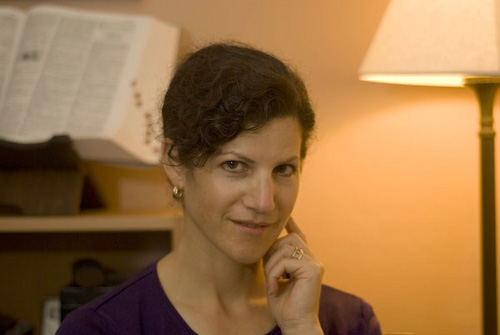
Photo by Andrew McDonald
PANTS, POWER, AND POLITICS
SFSOS guilty of behavior its members claim to
despise
SFSOS President fails to disclose
personal financial benefit from group
By Daniela Kirshenbaum
October 15, 2006
Sell a lot of pants and you can control San Francisco's destiny.
You can at least throw a pile of money around in the attempt.
You might have a trusty knight do it for you, who enriches himself
in the process. It's a startling example of how reform needs to
begin with the reformers themselves.
Consider the case of Don Fisher, founder of Gap Inc. If you're
wearing a pocket t-shirt you probably already know that he and
his wife were fortunate to sell enough casual clothing to make
quite a few billions of dollars.
Some billionaires fund the curing of global scourges. Others
try to win the game of life by dying with the most toys. A few
go the salt-of-the-earth route, and give most of the wealth away.
Mr. Fisher falls into none of these categories. He has divvied
up most of his cash amongst his heirs, and the sizable remainder
is bestowed upon projects that he deems worthy. You can do that
when you've sold that many pants: you can deem what is worthy
for an entire city, even.
One of Fisher's interests is schools. Fisher serves on California's
State Board of Education, and funds various school programs that
some people like. He and his family are also involved in Mendocino
timber, and some people don't like that at all.
But Fisher seemingly seeks to control the city of San Francisco
itself. His instrument of domination is SFSOS, a group he started
back in 2001 to "save" the city. At the time, Wells
Fargo scion Warren Hellman (originally of Crocker Bank lineage)
and Senator Dianne Feinstein were partners in the SOS project.
All three had plenty of cash and star power galore.
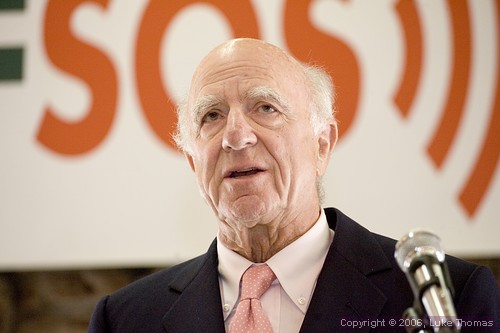
Gap founder Don Fisher at the most recent SFSOS luncheon.
Photo by Luke Thomas
The kick-off event at Delancey Street was packed with people
who were ready to sign on and rub elbows with royalty. That evening,
Senator Feinstein spoke of her dismay at what was happening to
our city. Chain-link fence, for example, was being installed along
medians on Geary Boulevard.
Wade Randlett, President of SFSOS, spoke passionately about what
it would take to save San Francisco, and articulated the maxim
still listed on the group's web site: they would support issues,
not candidates. It all sounded vague, but quite noble.
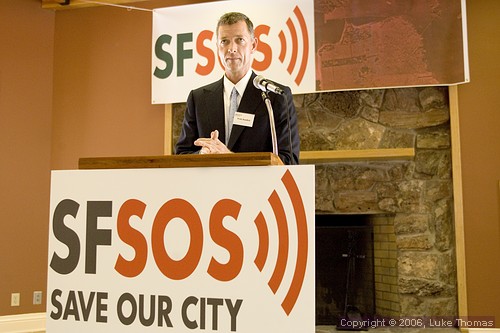
SFSOS President Wade Randlett.
Photo by Luke Thomas
Scott Hauge certainly thought it sounded worthwhile. He is the
founder of the Small Business Advocates, and was a member of the
SFSOS community board for its first two years. But then, he says,
"They became stinging in their attacks. I broke away when
it morphed into more of a candidate thing than an issue thing,
and they started supporting candidates."
This is an important distinction, and a critical potential loophole.
Endorsing - or attacking - candidates means there are donation
limits of $500, or establishing a committee that carefully reports
all donors and donations. Plus you have to identify yourself on
any mailings or communications. This is true for corporations
as well as non-profit organizations. (SFSOS is listed with the
state as a corporation.)
But if you are taking a position on an issue, and not
a candidate, then you aren't subject to those spending regulations.
SFSOS focuses heavily on candidates. So when they say they are
only about issues, they are also saying they needn't be held to
any campaign finance limits.
Indeed, as Hauge notes, SFSOS was not just about issues. The
group regularly sends out thousands of attractive e-mails excoriating
what they continually call "the extreme left" of the
Board of Supervisors.
Supervisor Aaron Peskin was an early target for SFSOS scorn.
Supervisor Jake McGoldrick was told printed attacks on behalf
of his campaign opponents were funded by the group. But when SFSOS
was tied to a particularly vicious mailing against Supervisor
Gerardo Sandoval, complete with swastika, a lot of the group's
support faded.
Feinstein and Hellman had walked away by this time, when they
realized that the organization was going to be used to launder
funds to pay for the attacks, instead of opposition to a ballot
measure.
Now only Fisher is left as a mainstay, with Wade Randlett running
the operation. That hasn't stopped SFSOS from steaming ahead.
And of all the political figures who receive the wrath of Fisher's
group, it is District 6 Supervisor Chris Daly who meets with the
most continuous onslaught of sheer hatred.
Sarcastic e-mailed screeds from SFSOS regularly load on paragraph
after paragraph fuming about Daly, and interpreting his every
move in the worst light possible. When he declined to attend a
recent forum to debate challengers to his seat, SFSOS claimed
it was "because he doesn't think everyone there already agrees
with him." The group also routinely lambastes Daly for living
in a condo rather than his former Tenderloin apartment.
Most crucially, they aren't shy about exhorting readers to join
their bandwagon. "Daly's gotta go," said one of their
recent e-mails. "Join the team to oppose him."
Their unabashed support of Rob Black, Daly's best-funded challenger,
and their continual attacks on Daly himself, are activities that
can only be seen as naked campaigning for and against candidates.
It's precisely the kind of behavior that campaign finance laws
are meant to address.
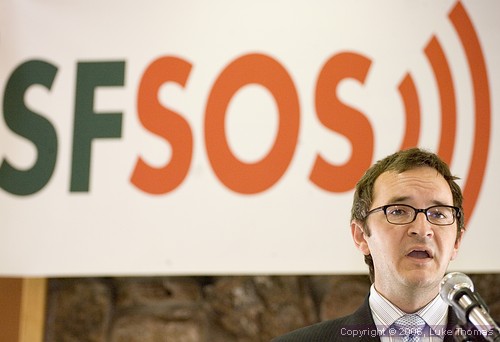
Rob Black, candidate
for District 6 and SFSOS keynote speaker.
Photo by Luke Thomas
But SFSOS plays dumb on this. "Our structure isn't really
relevant," says Ryan Chamberlain, the group's field director.
"It's pretty loose. I'm just a guy on a mission. I don't
see donors or touch fundraising. If I had to file FPPC or Ethics
Commission reports tomorrow, I would be clueless."
As Chamberlain speaks, he gets more inflamed about Chris Daly.
Clearly, he believes in the work he is doing. So there is no need
for the billionaire's hands-on direction. "I've met [Fisher]
I think twice," explains Chamberlain. "He donates money,
but so do a lot of people. We want the face to be the face of
a crowd. We don't ever want this to be about one guy and his agenda."
Echoing the SFSOS web site, which describes itself as "grass-roots,"
Chamberlain paints a portrait of SFSOS as a home-spun organization
roiling with angry, middle-class, would-be homeowners, all sending
in furious e-mails.
But many of those e-mails are form letters from members of Plan
C, a group affiliated with SFSOS that is comprised largely of
real estate professionals. Plan C is remembered for demanding
that Supervisor Bevan Dufty vote to exempt five projects from
a temporary moratorium on building in the Showplace Square neighborhood
of Potrero Hill a couple of years ago; Dufty complied. Those projects
were sponsored specifically by the Residential Builders Association,
until recently known more for bullying tactics at City Hall than
for any value they added to residential neighborhoods.
Another group under the SOS umbrella is "Citizens for Reform
Leadership," an independent expenditure committee formed
specifically to oppose Daly. Chamberlain explains: "We're
required by Ethics to set up a separate committee for fundraising.
That's a technicality of it. There's a fine line between a committee
set up to run opposition against Daly and for Rob Black."
But a look at the fundraising reports the committee is required
to file with the Ethics Commission reveals only a single donation
of a mere $250 from an unknown person named Dandy Wong. That's
not enough money to design a flyer, much less to blanket a district
repeatedly with glossy mailers. And none of those mailers carry
the SF SOS name as required. Something very big is missing from
those filings.
Neither Don Fisher nor Wade Randlett responded to requests for
an interview.
Paul Melbostad takes a dim view of SFSOS. He is the former chair
of the Ethics Commission, and these sorts of activities moved
him to sponsor legislation in 2000 for contribution limits to
independent expenditure committees. That led to the city's public
financing for campaigns, to try to level the playing field for
all candidates, wealthy or not.
"SFSOS is going against the concept of one person, one vote,"
says Melbostad. "Do they believe they can control City Hall
because they're wealthy?" A little cursory investigating
on his part - calling registered phone numbers, and checking billing
statements - revealed that Randlett is acting as front man, calling
many of the shots. And it looks like he is spending Fisher's money.
Right now, SFSOS's main efforts and independent expenditure funds
are pouring into getting Rob Black to defeat Daly in November.
Black states he has "no idea" who is behind the independent
expenditure committees that put out the copious
mailings supporting him. As for SFSOS, he says "I don't
meet with the guys from SOS, I don't talk to them. I know they're
out there doing stuff, but it's not related to the campaign."
Melbostad speaks knowingly in response. "People should be
skeptical, considering that Rob Black used to work for Jim Sutton
himself, who would design scams to get around campaign finance
laws." He adds that SF SOS has a history of supporting candidates
that they can count on to carry the legislation they like. Supervisor
Michela Alioto-Pier is one, he notes, and Rob Black was her aide
until recently.
What really annoys Melbostad, though, are the continuous and
flagrant campaign ethics violations. He was finally moved to give
a campaign donation to their nemesis: Supervisor Chris Daly. Within
legal limits, of course.
There's a grand irony here, and it starts with the near-visceral
response that so many people have towards Chris Daly. His outbursts
and his stubbornness are so provocative that his detractors often
can no longer see anything positive in him. Sometimes the response
to hearing his name is a roll of the eyes, or shake of the head.
More frequently, though, one can test these reactions. Wasn't
there a ripple of guilty excitement amongst those outraged at
Willie Brown after they heard about Daly's near-fist-fight with
the then-mayor? Wasn't there shock, but then a secret sigh of
relief, when Daly appointed a hugely qualified candidate to the
PUC instead of the juvenile thug Andrew Lee during Mayor Brown's
absence? Is Daly not intelligent and hard-working, with a slavishly
loyal constituency?
Even Daly's opponent, Rob Black, admits that Daly has done well
by the physical and mental health programs in his district. And
Scott Hauge of the Small Business Advocates says that while they
might disagree on policy, he genuinely likes Daly because of his
forthrightness.
E-mail bulletins from SFSOS have nothing positive whatsoever
to say about Daly, and take a rather sand-box approach to their
differences. They call him "childish" and demean his
supposed inability to be a "grown-up."
What would be the "grown-up" thing to do? Perhaps sit
down and discuss divergent approaches? Establish compromises?
Has SFSOS tried this approach?
Chamberlain scoffs at the idea. "Daly won't sit down with
us or with anyone who disagrees with him," he says.
Has Chris Daly rejected overtures? Has he been rude to these
titans who presume to save our city at any cost? "No,"
he responds. "I think I met with Fisher in 2001, after I
was elected. I don't believe I've ever had a conversation with
Randlett or Chamberlain." How about meeting with them? "I
would have early on, before the swastika stuff," he says.
And he dismisses SFSOS as being "Astroturf," not "grass-roots."
One could conclude that SFSOS is more comfortable wielding expensive,
illegal, and nasty campaigns that run the risk of turning voters
off altogether, than of approaching another human with whom they
disagree to see where they might forge a slender alliance. Though
they repeatedly accuse Daly of being "childish," they
too seem guilty of an immature approach. (Divisive politics isn't
helpful on the national level, either.)
Worse, as Melbostad points out, is SFSOS's dishonesty. But even
he was unaware that Randlett has a personal stake in the homeownership
issues that SFSOS takes on. It's not widely reported that Wade
Randlett is a founder of the E-Loan, Inc., the world's largest
on-line residential mortgage lender. He still serves on their
board, and is listed as a 10% owner.
It would be one thing if Randlett pointed to his corporate background
as a rationale for his passion on the subject. It's quite another
thing to be so secretive about it that even Ryan Chamberlain,
his primary coworker, doesn't know. "I don't think he has
any business interests like that - outside of his own home,"
said Chamberlain when he was asked.
Randlett - and SFSOS - push for home ownership and for helping
TIC buyers. E-Loan also sells its mortgages to Wells Fargo, Hellman's
bank. The whole situation seems to be more than just private altruism,
however unpleasant. By being so undercover about his ties to the
lending industry, Randlett exposes SFSOS to more accusations of
playing the worst kind of politics: personal enrichment, along
with illegal campaign practices, on top of camouflaged mud-slinging.
Where Fisher stops and Randlett starts is anybody's guess.
What if the billionaire and his team are right, and Daly must
"go" in order to "save" San Francisco? Is
SFSOS going about it the most effective way? Do the ends justify
the vicious means?
Melbostad says no, that SFSOS doesn't get its way very often
at the ballot box. "I've thought about calling Don Fisher
and letting him know that Randlett and [Attorney Jim] Sutton are
pissing his money down the toilet. Fortunately, they don't have
a very good track record. San Francisco voters are at least skeptical
when they get these mail pieces."
After thinking a bit, Melbostad adds: "Does Fisher just
write the check?"
By selling enough pants - and enough loans - the money will keep
flowing and San Francisco will pay the price. The city needs the
Ethics Commission, the District Attorney, and the City Attorney
to put a stop to it.
Kepa Askenasy contributed to this report.
SIDEBAR
Some nitty-gritty on how SFSOS campaign finances
work
Originally, SFSOS set up a committee to oppose ballot measures.
This committee was set up by Attorney Jim Sutton.
When Feinstein and Hellman learned that this committee was going
to fund hit pieces against District 11 candidate Supervisor Gerardo
Sandoval, they distanced themselves from the group. This is when
Sutton terminated the original committee and set up another committee
instead, for which he was treasurer.
Sutton accepted two contributions of $24,500 from Don Fisher,
the sole contributor to the committee. Sutton claimed that the
purpose of the committee was to defeat a ballot measure. In fact,
all the materials the committee produced urged defeat of Sandoval,
and supported opposing candidate Myrna Lim.
These materials included images of swastikas and dying AIDS patients.
They were sent only to District 11, which is more evidence that
simply defeating a city-wide ballot measure was not the group's
intent. The mailers did not carry the identity of the sender as
required, and had only the return address of a mail house at 4
Dorman Avenue.
The cost for the mailings - and the total of the illegal contributions
SFSOS and Sutton laundered - clearly exceeded the voluntary spending
limit of $86,000 for candidates for supervisor.
After the election, in which Sandoval was reelected, Fisher donated
another $50,000.
What is allowed
Wealthy individuals have the same First Amendment rights as everyone
else, and are allowed to spend as much as they like to publicize
and express personal views.
What is not allowed
Contributing more than the legal limit of $500 to a committee
making independent expenditures to support or oppose a candidate.
The Supreme Court has upheld contribution limits as constitutional.
Source: Paul Melbostad, private civil attorney and former chair,
Ethics Commission.
More information
SFSOS website: www.sfsos.com
Chris Daly campaign website: www.daly06.com
SFSOS political effort on home ownership, click
here.
Wade Randlett, involvement with E-Loan, Inc., click
here.
E-Loan's new type of TIC mortgages, click
here.
Form letter by SFSOS calling for TICs; supporting legislation
carried by Supervisors Dufty and Alioto-Pier; and disparaging
Daly for his "assault on homeownership," click
here.
Randlett calls for "public disclosure and playing by the
rules", click
here.
####
Call it Ultimate Real Estate
By Daniela Kirshenbaum
September 24, 2006
Don't sob for the San Franciscan who has just lost his view
to a boxy new development. Fear instead the bigger picture.
Think of the city's local connection to the number 37, as in
Oregon's Measure 37, the most stylish bit of new legislation.
It's now all the rage in at least six more western states. California
will vote on Prop 90, its own vicious version, this November.
Here it's titled the "Protect Our Homes Act." Get it?
The very title calls to mind wicked governmental meddlers using
terms like "eminent domain," who are poised to swoop
in and seize your house, your land, your property and your dog!
An east coast real estate tycoon is paying for the campaign (see
link below). He wants you to fear the property rights dismantler.
Your reward, with the passage of Prop 90, will be the right to
demand Cash Money from the evil state any time zoning regulations
come along.
Of course, the state can't start writing checks to everyone.
So they will just drop. Any new. Land use. Regulations. Wow.
The imagination boggles with the possibilities. After all, this
could kill any kind of rezoning! Let's see: how many units do
you figure you can jam on that little bit of land between your
garage space and the front door? How wide could those floodgates
open?
Poor Oregon started this whole new age gold rush. Now, you can
order your very own copy of a "claim manual," designed
for draining your share of money out of Salem's coffers. Just
click
here.
What could this mean for San Francisco? Well, just across the
Bay last week, Berkeley Mayor Tom Bates and the City Council rushed
through some adjustments to their land use laws, in case Prop
90 passes.
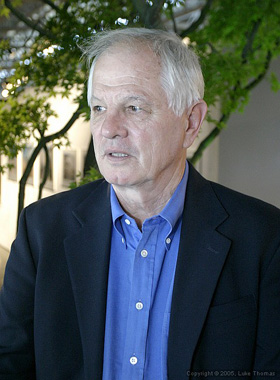
Berkeley Mayor Tom Bates.
Photo(s) by
Luke Thomas
"Both Berkeley and San Francisco are very dense,
built-out places where neighborhoods need protection," said
Cisco DeVries, Chief of Staff to Berkeley Mayor Tom Bates. "This
state proposition would come in and undermine our ability to determine
how much to build and where to build it."
Who likes having no control over one's built environment? Not
the fragile neighborhoods that make up the celebrated "character"
of San Francisco. We are all too used to relinquishing control
- frequently over all-too-insensitive new development. We mustn't
be naïve: the passage of Prop 90 could be another blow in
favor of a continued scramble for development dollars, damn the
inconvenience to those affected.
Fortunately, people in the neighborhoods have started practicing
the honored dictum of "following the money." We may
be densely populated and built-out city, as Mr. DeVries notes,
but that's not stopping the vast numbers of people - speculators,
land use attorneys, and lobbyists are but a few - who support
themselves handsomely in the development trade. Many use righteous
titles: "green" and "affordable" and "family"
and "workforce" are all happy adjectives used in the
marketing of character-crushing development.
What's needed, of course, is a really strong set of city departments
- and that's even if Prop 90 doesn't pass. We need a Planning
Department with a leader who can see (without help) that we need
big, comprehensive solutions because we won't win the race in
building enough housing. We need a Building Department with a
leader who can boost morale by avoiding favoritism and rewarding
merit, so that inspectors can perform their jobs without fear.
During the previous mayoral administration, payrolls were fattened
and merit was confused with loyalty. That alone is adding to the
number of steps it will take to get those strong city departments
we crave.
In the meantime, a small band of savvy neighborhood veterans is
meeting at City Hall most Fridays. They call themselves the San
Francisco Neighborhood Network, and their motto is "Good
Planning, Good Government."
I used to meet with them myself. In fact, I helped establish the
group. But with threats like Prop 90, you might want to join them
in their effort to keep our city planning and our city government
accountable.
One veteran land use attorney calls Prop 90 a "meat axe."
Cisco DeVries wonders: "Prop 90 doesn't make a lot of sense
- will people be able to look past the eminent domain bait and
understand that? That it will be 'guess what, discussion over?'"
As Supervisor Chris Daly puts it: "If I win the election
and Prop 90 passes, I can take off for the beach -- there'll be
nothing for me to do!"
More information:
San Francisco Neighborhood Network
Contact - jim.meko@comcast.net
Oregon's
Measure 37
"Claim
Manual" for Measure 37
California's
Prop 90
####
Editor's Note: Views expressed by columnists
published on FogCityJournal.com are not necessarily the views or beliefs of
Fog City Journal. Fog City Journal supports free speech in all its varied forms
and provides a forum for a complete spectrum of viewpoints.
|